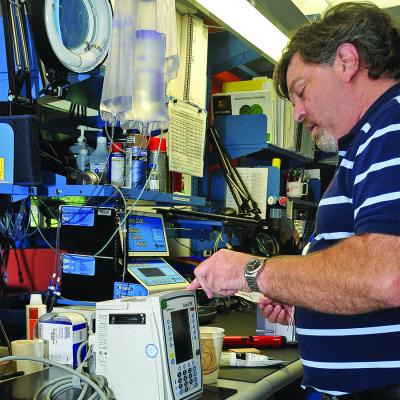Biomedical equipment technician: An unknown and in-demand career
Besides doctors and nurses, there are many professions that help hospitals and medical facilities run smoothly. Biomedical clinical equipment technicians are some of these essential personnel.
"Biomed tech is not a well-known profession, but it is continually growing," said Michael Brown, San Jacinto College professor. "The industry is in high demand, and right now we have a full program. Every year we see more students enroll."
In 2015, Money Magazine defined "The 5 Best Jobs You've Never Heard Of," described as high-paying, under-the-radar careers that are growing faster than the national average. The second job listed was medical equipment repairer or biomedical equipment technician. These professionals repair, replace, test, calibrate, and maintain sophisticated medical equipment.
"In the current market, there is a great shortage of technicians," Brown said. "In the next 10-15 years, more than 3,000 technicians will be needed. Many of my students are hired while in school, and nearly all graduates walk right into jobs."
There is a strong need for entry-level technicians. These employment opportunities are driven by two factors: growth and replacement.
In two years, San Jac students can earn an Associate of Applied Science degree in biomedical clinical equipment technology and go on to work for third-party contract companies, manufacturers, and major hospital groups.
While they don't provide direct patient care, they are a key part of the health care team, ensuring that emerging medical technologies are running smoothly so nurses, doctors, and other providers can offer the best possible patient care.
"A technician who has a reputation of doing a good job can go far in the industry," Brown said. "Hospitals assign you an entire department like the emergency room, and you are responsible for every piece of equipment in that space. It's a pretty independent job, and each day is a challenge."
In his years in the biomedical technician industry, Brown traveled internationally to help repair equipment in underserved countries, most recently in 2016.
"I have traveled to Kenya many times to use my skills as a technician," he said. "There are organizations that send you around the world to help service the equipment desperately needed to treat people in these rural areas."
Over the years Brown has seen many upgrades in equipment, but the basics remain the same.
"Technology becomes obsolete, but the inner workings of the machines haven't changed much in the last 10 years," he said. "The basic principles come from troubleshooting the problem. Sometimes all it takes is replacing a broken plug or a worn-out gasket."
Brown's students gain experience outside the classroom through internships and hands-on experience in the labs of San Jac's health science programs.
"We travel to each campus and work on hospital beds, heart monitors, even microscopes in the science labs," said Brown. "It gives students an opportunity to practice with real-world examples of the classroom work we do every day and to serve the College."
Learn more about the biomedical clinical equipment technician program.

